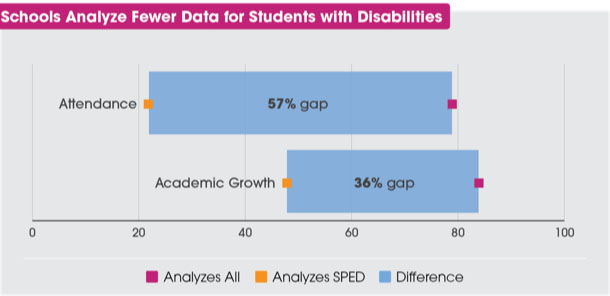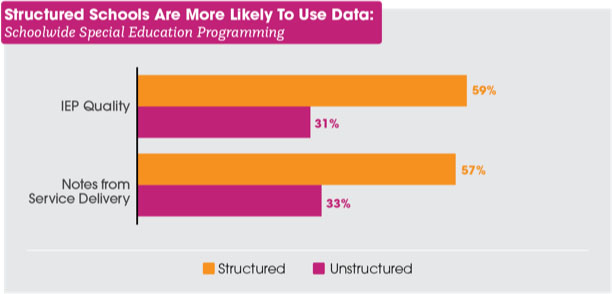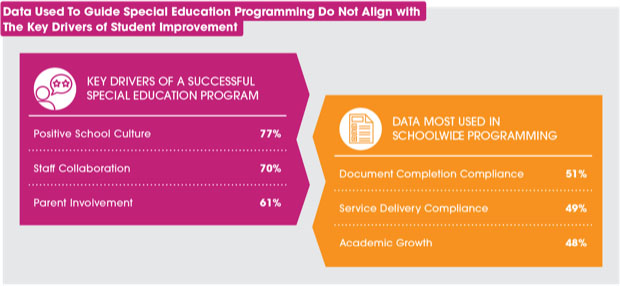Sandelius: As Schools Reopen for the Year, 3 Ways They Can Use Data to Help Their Special Education Students Succeed

In swimming, sailing, racing or any number of other sports, one of the keys to a successful outcome is how you start. Strategic skills that give you the right footing from the gate can mean the difference between a steady stride and an all-out sprint to the finish line. Starting the school year is no different.
Around this time, schools are busy setting up the systems and structures from which they’ll operate for the rest of the year. It’s a key inflection point for building an equitable, inclusive school environment that meets the needs of all learners. But as The Ability Challenge documents in our new white paper, “Opportunity Accelerated: Exploring the Connection Between Data Collection, Special Education Programming, and Improved Outcomes,” only 54 percent of educators say they work in schools where leadership prioritizes special education.
With this in mind, here are three recommendations, building on our survey insights, for ways in which schools can bolster their special education programming by integrating data into those systems and structures.
1 Use the data that are already being collected.
We know that data, used strategically by educators, lead to better outcomes for students and that schools collect loads of data. Education technology companies desperately want the information. Parents and advocates want to protect it. Yet study after study shows that teachers have it and either can’t or don’t always know the best way to use it.

Our research shows that there are often wide gaps between the types of data being analyzed for all students and those being analyzed for students with disabilities. Making slight tweaks to practice in using data for students with disabilities — such as generating measurable, data-based leadership goals or reviewing last year’s attendance rates by subgroup to modify outreach during the first 30 school days — could yield big results.
2 Ensure alignment between success and practice.
Our survey also revealed a substantial disconnect between what data schools say are important for success in special education and what they are actually doing in practice.

Notably, though almost 70 percent of schools consider staff collaboration to be a key driver for a successful special education program, only 35 percent of schools have structures to facilitate planning between special education and general education teachers. Furthermore, our survey revealed that having formal structures for collaboration directly correlates to using more data for special education programming. Clearly, schools looking to make advances on behalf of diverse learners should find ways to build systems for collaboration into their schedule.
Similarly, though almost 80 percent of those surveyed reported that having a positive school culture was also a key driver of success, far fewer (60 percent) said they collect any type of social-emotional or behavioral data on students. Rather, compliance data are frequently most used for special education programming. Being compliant is important, but compliance alone is not sufficient to make any impact on school culture.
Schools considering adding new data collection protocols should focus on measuring social-emotional skills in students or in tracking overall school culture as a way to build more inclusive practices across their varied learning communities.

3 Enhance tools for special education programming.
After hearing from more than 500 schools, it is clear that there is no single solution that adequately tracks special education programming in ways that facilitate decision-making on behalf of individual students with disabilities as well as schoolwide planning. Schools may not be using data for special education programming as much as they could because state and local reporting systems, currently used by more than 50 percent of schools, inadequately track special education outcomes.
Individuals with the ability to make decisions about what tools schools use should focus on employing systems and structures that are flexible, include usable reporting functions and integrate with other data tools used to track outcomes for all students. Though this recommendation may be most salient at the district, network or agency level (as purchasing, including technology, is frequently a centralized function), educators should seek out, develop and share the tools they have that can be used to more easily distribute information to the educators who need it to meet the needs of diverse learners.
Even with few resources, schools can combine publicly reported school-level data with free data visualization software to facilitate examination of trends broken down by subgroup. Using this type of strategy to set ambitious yet attainable goals and continually revisiting progress consistently throughout the school year can produce significant transformations in student outcomes.
Sarah Berger Sandelius is founder of The Ability Challenge, which provides tools and information that close the gap between compliance and quality. She also serves as an independent strategic consultant to schools, districts and nonprofit organizations through her firm, FlipTurn Education Consulting.
Get stories like these delivered straight to your inbox. Sign up for The 74 Newsletter

;)